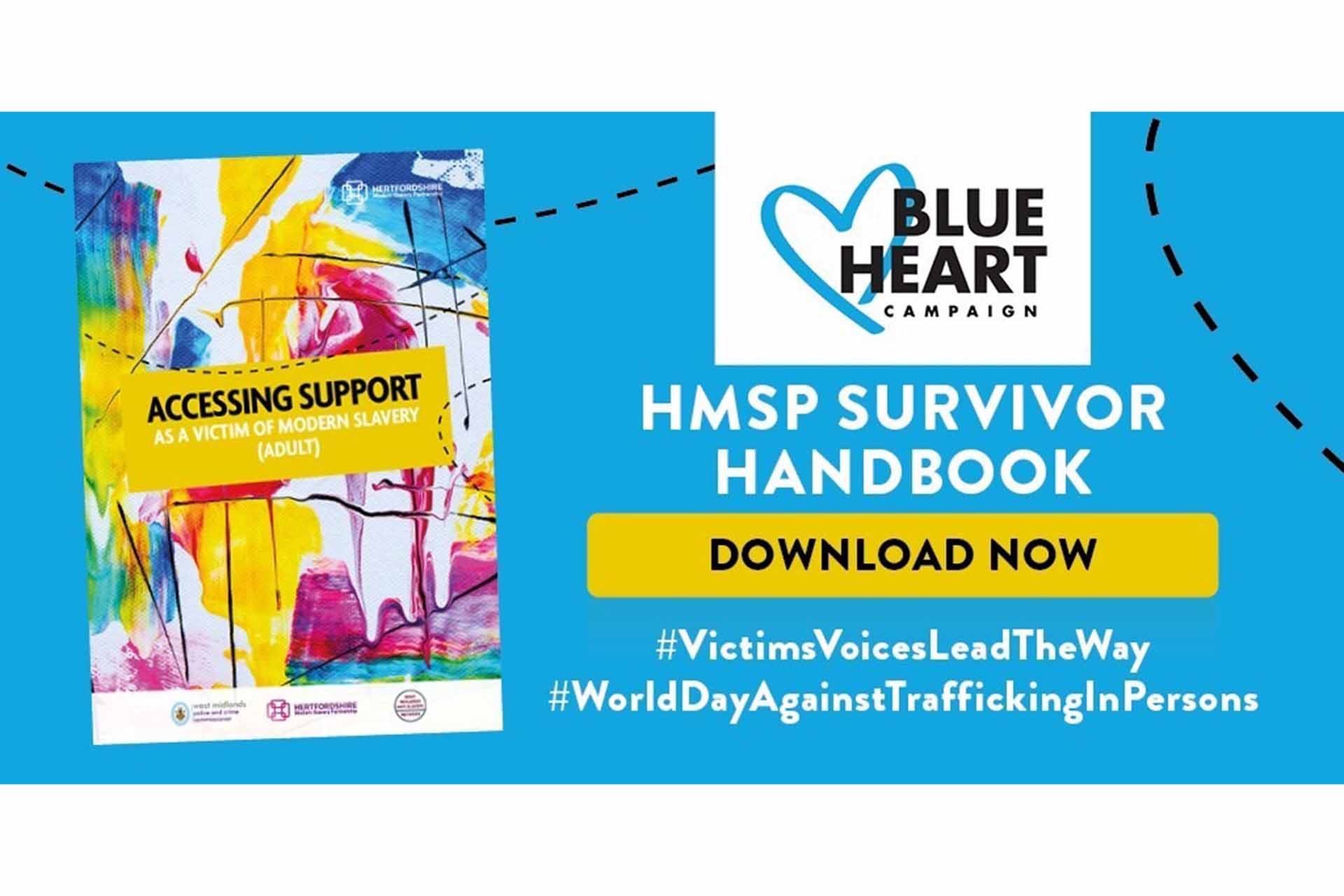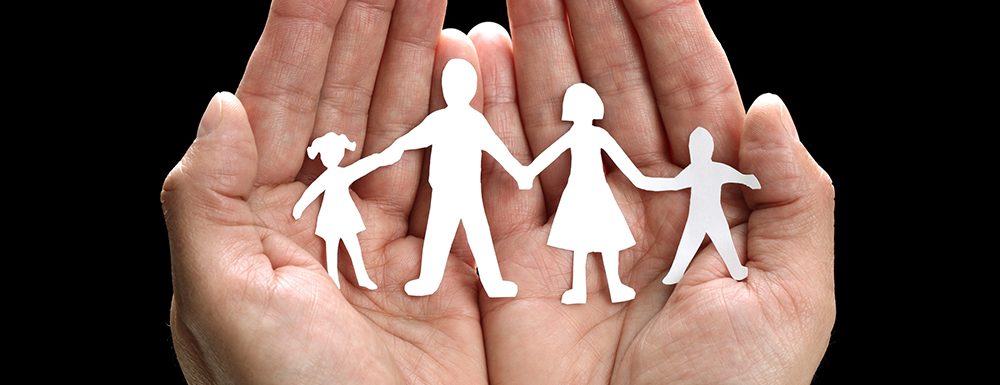
For World Day Against Trafficking in Persons (WDATIP) 2021, the theme is victims’ voices lead the way. And this year we are publishing a Survivor Handbook which has been designed to empower victims and survivors of modern slavery, by giving them the correct information on the support available to them. We hope it will allow survivors to make informed decisions about their next steps and put the power in their hands to determine their own journey.
There are currently estimated to be 100,000 victims of modern slavery in the UK, yet this is a statistic that many people would not be aware of. Victims are hidden in plain sight and often go unseen and unheard, unsure of where to go for help and what help would even look like. At Shiva Foundation we are dedicated to tackling exploitation and believe that putting the voices of victims at the centre of discussions is an essential part of this. We need to empower victims, amplify their voices and most importantly, listen. Through this, we can formulate the most effective response to fighting these crimes and provide the best support for victims.
“Today is about empowering and amplifying survivor’s voices, and helping them tell their story themselves. Tomorrow is about all of us sitting up to listen” says Shiva Foundation director, Councillor Meenal Sachdev.
Here are some stories that shed light on the impact of not listening.
Jamy
Jamy became known to the Youth Offending Service at 15 years old on an assault case. He had no history of criminal behaviour and wasn’t known to Children’s Services. Eight weeks before his Youth Court appearance, he was arrested and referred to Children’s Services because there was a belief that he couldn’t return home. This was refuted by his father and Jamy’s case was closed. But that wasn’t the case. Jamy wasn’t living at home and instead lived with an older ‘friend’ who had a history of criminality. Jamy turned 16 and when it became more apparent that he had been a potential victim of county lines, there was a change in his behaviour. Time had passed and his responses to questions from supporting organisations were much more dispassionate and seemed coached. He refused all support offered to him.
There was an opportunity to listen to Jamy and to understand his needs, but as can happen, that window was small and not taken.
Aleah
Aleah lives with her spouse and his family. She was carrying out what she thought were her “duties” as the youngest daughter in law. She was responsible for domestic help and was given £10 per month allowance. She was also controlled through physical and verbal abuse, fear and manipulation. When her abuse reached a level that she thought was no longer a normal part of her spousal arrangement (when weapons were used), she sought help from the local police.
When Aleah came to the police, she was rightly identified as a victim of domestic abuse; but modern slavery was not identified at first. Many organisations who have the responsibility of protecting and supporting the public do not understand the direct relationship between modern slavery and domestic abuse; many victims do not understand this either.
It is important that people like Aleah are given the information they need to understand what help is available to them and to make their own decision about what help to seek.
Borys
Borys was first found by a police officer rough sleeping in a car park. He didn’t have any money for food. After further investigation, Borys was suspected as being a victim of forced labour. His family were all in Estonia and they had actually reported him as missing. Borys was given information about the UK’s National Referral Mechanism, but he declined. All he wanted was to return home. Travel was arranged and paid for on his behalf and he was able to return to Estonia.
There are misconceptions about people doing everything and anything they can to live in the UK. Many believe that people will accept any work, regardless of how exploitative, because it gives them the opportunity to remain. This may be the case some of the time, but not always. We must listen to people, their stories and their wishes if we are going to give them appropriate support out of situations of exploitation.
We are only reporting roughly 10% of the estimated victims of modern slavery in this country. And of them, only a few are accessing appropriate survivor-led support. We know that we can do better.
Catia
Catia had been identified when she presented at A&E with back pain. She was underweight, unkempt, frightened, distressed and couldn’t communicate well due to her limited English. Catia was given a Portuguese translator and she was able to tell the story about her visit to her daughter. Her daughter Aline had been working consistently long hours at the hairdresser she lived above. When Catia arrived at the property, her passport was taken away by the landlord and hairdresser owner – Aline had already had hers taken away. The landlord was physically violent towards Aline and her child, multiple times. Aline was locked in the property and was visited by unknown men. She was allowed to take her child to school, but only with supervision.
Catia was incredibly concerned about the welfare of her daughter and grandchild. But Catia’s case wasn’t taken forward and she wasn’t given the support she needed. She hadn’t been heard.
The Survivor Handbook
The Survivor Handbook was created by the West Midlands Anti Slavery Network for their local area, and our partner – the Hertfordshire Modern Slavery Partnership – has adapted it for Hertfordshire. The handbook is a comprehensive guide to a survivor’s options within or outside of the National Referral Mechanism. It has been translated into the 12 most commonly spoken languages locally, making it widely accessible. The guide will be shared with hundreds of different agencies and organisations across the county and beyond, who may come into contact with survivors.
Access the Handbook here:
- English: https://www.stopexploitationherts.org.uk/wp-content/uploads/2022/10/survivor-handbook-hmsp-1.0.pdf
- Albanian: https://www.stopexploitationherts.org.uk/wp-content/uploads/2022/10/survivor-handbook-hmsp-albanian-1.0.pdf
- Bulgarian: https://www.stopexploitationherts.org.uk/wp-content/uploads/2022/10/survivor-handbook-hmsp-bulgarian-1.0.pdf
- Chinese (Mandarin): https://www.stopexploitationherts.org.uk/wp-content/uploads/2022/10/survivor-handbook-hmsp-chinese-mandarin-1.0.pdf
- Latvian: https://www.stopexploitationherts.org.uk/wp-content/uploads/2022/10/survivor-handbook-hmsp-latvian-1.0.pdf
- Lithuanian: https://www.stopexploitationherts.org.uk/wp-content/uploads/2022/10/survivor-handbook-hmsp-lithuanian-1.0.pdf
- Polish: https://www.stopexploitationherts.org.uk/wp-content/uploads/2022/10/survivor-handbook-hmsp-polish-1.0.pdf
- Romani: https://www.stopexploitationherts.org.uk/wp-content/uploads/2022/10/survivor-handbook-hmsp-roma-1.0.pdf
- Romanian: survivor-handbook-hmsp-romanian-1.0.pdf
- Slovak: survivor-handbook-hmsp-slovak-1.0.pdf
- Vietnamese: https://www.stopexploitationherts.org.uk/wp-content/uploads/2022/10/survivor-handbook-hmsp-vietnamese-1.0.pdf
By Gabriella Jiménez


